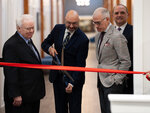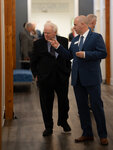

CLEVELAND, Ga. — Truett McConnell University honored the late Charles Stanley on Tuesday, Oct. 22, dedicating the Dr. Charles F. Stanley Global Impact Center. Distinguished guests, several trustees, University administrators and faculty, and students attended the dedication. Stanley was remembered for his providential purpose, his passionate preaching, and his persistent and powerful prayers.
Stanley was pastor of Atlanta’s First Baptist Church for more than 50 years, the founder of In Touch Ministries, a New York Times best-selling author, and an avid photographer.
Inspired by Psalm 67:2 (TLB), “Send us around the world with the news of Your saving power and Your eternal plan for all mankind,” Stanley proceeded to seek out and employ innovative technologies to send the message of Christ to the ends of the earth. Today, “In Touch” is broadcast on thousands of television, radio, and satellite networks and stations worldwide and translated into 160 languages.
The center also includes the Stanley Chair of Theology, which was endowed to honor Stanley and his teaching of the Word of God. Mael Disseau is the first professor to hold the Stanley chair. The center, located on the third floor of the Miller Building, houses a collection of ministry artifacts and an exhibit of Stanley’s photography.
The inauguration of the beautifully designed Global Impact Center included a welcome and introductory remarks by Truett McConnell University President Emir Caner.
Anthony George, who served as Stanley’s associate pastor for nine years prior to becoming his successor as pastor of Atlanta’s First Baptist Church provided a moving synopsis of Stanley’s life.
George spoke of the challenging life Charles Stanley experienced in his childhood, including the death of his father when he was only 9 months old and his heartbreaking remembrance of the mental and physical toll that his mother’s work took on her as she labored 10 hours a day in unspeakably atrocious conditions for a mere “pittance of pay.”
The death of his father, the hardships experienced by his mother, and the inferior standard of living caused Stanley to grow up with an unspoken sense of inferiority.
“In spite of her many hardships in life, the constant in Dr. Stanley’s mother was her unwavering faith in Jesus Christ,” George explained. “Dr. Stanley always attributed to his mother his unshakable dependence on the power of prayer. She consistently took time to pray with him. And when she did, she taught him to kneel as a sign of reverence and surrender before the Lord. Until he died, kneeling was his customary posture when he prayed.”
George added, “From childhood to adulthood, it seems that pain and disappointment were never far away from Dr. Stanley. The challenges of his family life as an adult surpassed the pain that he felt when he was a child. But he never stopped doing what he believed God called him to do.”
Paige Patterson, former president of both Southeastern Baptist Theological Seminary and Southwestern Baptist Theological Seminary, declared, “This beautiful Global Impact Center is an appropriate exclamation point to Charles Stanley’s legacy."
Patterson then went on to detail Stanley's impact. "First, Charles Stanley left us a legacy of prayer. We say we believe in prayer, but I fear that many have not gotten past the ‘Now, I lay me down to sleep, I pray the Lord my soul to keep’ kind of petition."
Patterson also mentioned Stanley's reliance on the Lord to provide for his needs and those of the ministry. "He was not a money-begging evangelist," Patterson said. "You never heard him begging for money. He trusted God to provide all his needs.”
Patterson continued, “Third, He had an impervious courage. I would not hesitate to choose him as my partner in a battle. When he became pastor of First Baptist Church in Atlanta, the church was filled with liberal people. He was under constant pressure. On one occasion someone threw an offering plate at him. It could have killed him, but he never thought of leaving. His undaunting courage manifested itself in many ways."
Stanley's photography reflected his appreciation for the Creator and His creation, Patterson explained. "Just look at the pictures that grace this building. He would go from Alaska to Tanzania to Patagonia taking photos and it was an avocation that he enjoyed and that blessed others."
Patteron concluded by saying, “Perhaps his greatest legacy was his desire to simply please God. During the Conservative Resurgence he kept telling those of us who were wringing our hands and fearful of our convention’s destiny, ‘Don’t get too wrought up about winning, because winning is not as important as pleasing God’. Charles Stanley was a man who pleased God, and that is what he desired for all of us.”
Both George and Patterson emphasized Stanley’s prayer life. TMU President Caner also stressed the importance of prayer, reminding his audience that the University was birthed out of a prayer meeting at First Baptist Church in Blairsville in 1946. “Two years later," he said, "this building (Miller Hall) was started, but it was 1956 before enough funds were provided for finishing the first two floors.
“We are dependent upon prayer and continuously asking God to SAVE, CALL, EQUIP, and SEND our students out into this world as ambassadors for Christ. The Dr. Charles F. Stanley Global Outreach Center is an answer to our prayers and will help us accomplish our God-given objectives.”